- Details
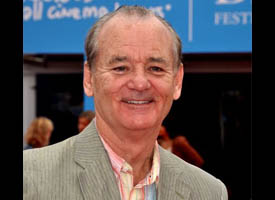 Famous actor and comedian Bill Murray was born on this day in 1950 to Lucille and Edward Joseph Murray II. Murray was raised in Chicago’s northern suburbs and began his stand-up career at the infamous Second City comedy club after an invitation to attend by his older brother, Brian Murray.
Famous actor and comedian Bill Murray was born on this day in 1950 to Lucille and Edward Joseph Murray II. Murray was raised in Chicago’s northern suburbs and began his stand-up career at the infamous Second City comedy club after an invitation to attend by his older brother, Brian Murray.
Soon after he joined Second City, Murray was recruited to join “Saturday Night Live” by another famous Illinois comedian, John Belushi. Murray joined “Saturday Night Live” in its second year, making him one of the show’s earliest stars. He worked as a cast member for three seasons from 1977 until 1980.
Murray gained national attention in the 1980s by starring in multiple blockbuster hits, including “Ghostbusters” in 1984, earning him a nomination for the Golden Globe Award for Best Actor in a Comedian or Musical. Murray won an Emmy Award last night for his role in the HBO mini-series “Olive Kitteridge.”
Learn more:
Read more about Bill Murray’s career on IMDb
Entertainment Weekly: Bill Murray wins Emmy for supporting actor in a limited series or movie
- Details
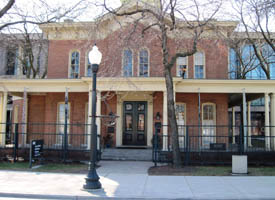 Chicago’s Hull-House opened its doors on September 18, 1889, on Chicago’s Near West Side. The home was Chicago’s first settlement house, which served newly arrived immigrants through a variety of educational, social and health support services. At the time, settlement houses were popping up all over industrial cities with large immigrant populations, mainly in the Northeast and Midwest.
Chicago’s Hull-House opened its doors on September 18, 1889, on Chicago’s Near West Side. The home was Chicago’s first settlement house, which served newly arrived immigrants through a variety of educational, social and health support services. At the time, settlement houses were popping up all over industrial cities with large immigrant populations, mainly in the Northeast and Midwest.
Jane Addams and Ellen Gates Starr, both from upper-middle-class backgrounds, opened Hull-House after the mansion’s owner, Charles Hull, donated his property to the women. By the early 1900s, Hull-House had expanded to include 13 buildings on two city blocks. Included in the complex were a gymnasium, theater, art gallery, boys’ club, nursery, kindergarten classes and dining and living quarters for staff members.
The work of Jane Addams and Ellen Gates Starr helped countless new citizens adjust to American culture and helped implement new laws protecting women and children and safeguards for workers.
Learn more:
Read more about the history of the Hull-House in Chicago
Visiting Hull-House? Read more about the Jane Addams Hull-House Museum
- Details
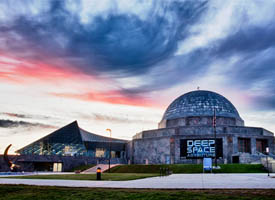 The Adler Planetarium, named after businessman Max Adler who helped create the museum, opened on Chicago’s Northerly Island in 1930. At the time, the planetarium was a first in the Western Hemisphere and featured astronomical instruments and antiques by Amsterdam astronomer W.M. Mensing.
The Adler Planetarium, named after businessman Max Adler who helped create the museum, opened on Chicago’s Northerly Island in 1930. At the time, the planetarium was a first in the Western Hemisphere and featured astronomical instruments and antiques by Amsterdam astronomer W.M. Mensing.
Throughout the years, additions and expansions at the Adler Planetarium have kept guests intrigued and curious with our expansive universe. The Doane Observatory, opened in 1977, features a large aperture telescope and allows viewers to see the Moon, planets, stars and galaxies that are trillions of miles away. Several theaters, including the Grainger Sky Theater, offer multimedia exhibits second to none.
Learn more:
Planning a trip to the Adler Planetarium? Visit the official website for essential travel information
Learn more about groundbreaking research taking place at the Adler
- Details
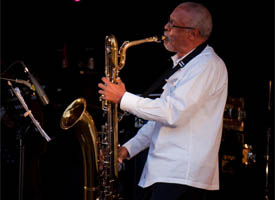 One of the most prominent baritone saxophonist of his generation, Hamiet Bluiett, was born on September 16, 1940 in Brooklyn, Illinois. He began studying clarinet at the age of 9 under his aunt’s tutelage. By the time he studied at Southern Illinois University, he had picked up the baritone sax and flute.
One of the most prominent baritone saxophonist of his generation, Hamiet Bluiett, was born on September 16, 1940 in Brooklyn, Illinois. He began studying clarinet at the age of 9 under his aunt’s tutelage. By the time he studied at Southern Illinois University, he had picked up the baritone sax and flute.
Bluiett launched a successful career after serving in the Navy for several years. During the mid-1960s, he moved to St. Louis, where he played with a musician’s collective known as the Black Artists Group. In 1969, he joined Sam River’s large ensemble, and he gained a famed place in one of Charles Mingus’ last great bands in 1972 thanks to his competency as a straight-ahead player.
In 1976, Bluiett recorded material for his first two albums, “Endangered Species” and “Birthright.” He went on to form the World Saxophone Quartet during the 1980s with David Murray, Oliver Lake and Julius Hemphill. The quartet became arguably the most popular free jazz band ever during the 1980s. The group played well into the 2000s.
World Saxophone Quartet’s early free-blowing style eventually transformed to include a mixture of bebop, Dixieland, funk, free and various world music. Its characteristic style was anchored and largely defined by Bluiett’s enormous sound.
Throughout his performing and recording career, Bluiett led his own ensembles and recorded a number of strong, progressive-mainstream albums for Black Saint/Soul Note. He also recorded and led sessions for Mapleshade Records during the mid-1990s with “Young Warrior, Old Warrior,” “Bluiett’s Barbeque Band” and “If Trees Could Talk.” He recorded “Libation for the Baritone Saxophone Nation,” “With Eyes Wide Open” and “The Calling” for Justin Time.
Bluiett has worked with greats including Sam Rivers, Babatunde Olatunji, Abdullah Ibrahim, Stevie Wonder and Marvin Gaye. He currently performs at gigs that include the New Haven Jazz Festival and with students from the Neighborhood Music School in New Haven, Conn.
Learn more:
Hamiet Bluiett: Redefining The Baritone Sax (NPR Music)
Hamiet Bluiett’s Discography
- Details
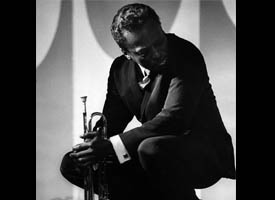 The father of Bebop, Miles Davis, was born in Alton in 1926, the son of a dental surgeon and a music teacher. Davis’ immense talent and interest in music was first cultivated at the age of 12 when he began taking trumpet lessons. In high school, he was already playing weekend gigs at bars in East St. Louis, where the Davis family moved shortly after Miles’ birth. After graduating from East St. Louis Lincoln High School and playing for several local St. Louis bands, Davis moved to New York City and attended the Institute of Musical Art (what is now Juilliard).
The father of Bebop, Miles Davis, was born in Alton in 1926, the son of a dental surgeon and a music teacher. Davis’ immense talent and interest in music was first cultivated at the age of 12 when he began taking trumpet lessons. In high school, he was already playing weekend gigs at bars in East St. Louis, where the Davis family moved shortly after Miles’ birth. After graduating from East St. Louis Lincoln High School and playing for several local St. Louis bands, Davis moved to New York City and attended the Institute of Musical Art (what is now Juilliard).
It was in New York that Davis made the transition to a professional jazz musician. He played in the Charlie Parker Quintet, worked with Gil Evans on creating a nonet and eventually landed a deal with Capitol Records. In the 1950s, Davis played in a quintet with John Coltrane, Red Garland, Paul Chambers and Philly Joe Jones. Davis released the studio album Kind of Blue in 1959. The album, which was certified quadruple platinum, is today acknowledged as one of the best jazz albums of all time. Davis continued his success into the 1960s and 1970s, recording several successful studio albums and touring with a host of artists across the globe.
It was Davis’ ability to experiment and push the limits of jazz music that made him so well-known. His innovative music earned him nine Grammy awards and the honor of being the first jazz musician to be featured on the cover of Rolling Stone magazine.
To recognize Davis’ birthplace and the role he played in musical history, the city of Alton recently unveiled a bronze statue of the music legend in their downtown entertainment district.
Learn more:
Learn more about the life and musical success of Miles Davis
More Articles …
- Did You Know? The first televised political debate was filmed in Illinois
- Did You Know? Singer and actress Jennifer Hudson is from Illinois
- Did You Know? Don Cornelius was born in Illinois
- Did You Know? The Oprah Winfrey Show made its national debut 29 years ago today
- Did You Know? Tennis icon Jimmy Connors was born in Illinois





